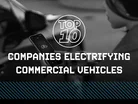Top 10: Companies Electrifying Commercial Vehicles

A tide of transformation is running through the corporate world as major players move to electrify their commercial fleets. These ten companies are shaking up their strategies, to reduce air pollution and improve their carbon footprints with eco-friendly transportation.
10. AT&T
AT&T is a telecommunications company based in Dallas, Texas. Since 2008, it has lowered its fleet emissions by 332,658 metric tonnes of CO2e and also downsized its vehicle fleet. The company has just entered into a pilot programme with Rivian, where it will change its commercial fleets to EVs, including Rivian’s commercial van and R1 platform trucks.
9. DHL
International express shipping service DHL partnered with PowerFlex to complete the installation of 415 Electric Vehicle Supply Equipment (EVSE) for its commercial fleet.
“At DHL Express, we are always looking for ways to make our operations more sustainable,” said Laurice Bancroft, SVP of Network Operations for DHL Express US. “Fleet electrification is one of the many strategies we’ve deployed to reduce our carbon footprint as we work toward our goal of zero-emissions. We look forward to scaling up our EV fleet and ensuring reliable, eco-friendly deliveries to our customers.”
8. Nestlé
Nestlé UK & Ireland has introduced more electric HGV trucks to its owned fleet, which have a driving range of 120 miles and which produce zero tailpipe emissions.
“Making our fleet as efficient as possible, whilst looking to reduce the environmental impact of our journeys, is front and centre of Nestlé’s logistics strategy,” said David McGhin, Transport Manager at Nestlé UK & Ireland. “We’re proud to say we’re very much early adopters of electric vehicles in the FMCG space, and we’re keen to test and learn what they can do as they could have a significant part to play in our journey to net zero, both here in the UK and as a global business.”
7. DAF Trucks
DAF Trucks is a leader in the trucking world and is keen to electrify its range without compromising on its reputation. The DAF LF Electric is capable of driving 280km/charge - subject to driver behaviour, outdoor temperature, load, and topography, of course - with a 282KW/h battery that can be charged from 20% to 80% in around 6.5 hours (or faster if using a rapid charger).
6. Amazon
Amazon began its roll out of electric vans in 2019 and is leading the way for other companies to follow. The company plans to be carbon-neutral by 2040 and to achieve the goal of 100,000 electric delivery vehicles by 2030. It has ordered its electric delivery vans from Rivian, an EV startup which Amazon has invested in.
5. FedEx
FedEx has a range of ambitious sustainability goals. Its phased approach to vehicle electrification is a crucial part of its roadmap to achieve carbon neutral global operations.
“In just under six months, we’ve taken delivery of 150 BrightDrop Zevo 600s for our parcel pickup and delivery fleet,” said Mitch Jackson, Chief Sustainability Officer, FedEx. “In today’s climate of chip shortages and supply chain issues, that’s no ordinary feat and a true testament to the collaboration between FedEx and BrightDrop.”
4. Aditya Birla Group
Aditya Birla Group is in the League of Fortune 500, with 187,000 employees from 100 nationalities and 41 countries. Its offerings range from chemicals to construction, telecoms to fashion. The company has agreed to the Zero Emission Vehicles Emerging Markets Initiative (ZEV-EMI) and the Indian government's E-FAST (Electric Freight Accelerator for Sustainable Transport) initiative, which aims to advance the electrification of the truck market in India. There are plans for 5,000 electric trucks in India by 2027 and 7,700 e-trucks by 2030.
3. Coca-Cola
Coca-Cola Europacific Partners will use 30 electric trucks across Belgium, through a key partnership with Renault Trucks. This will reduce its CO2 emissions by 75%, compared to when the company used diesel trucks.
“Our industry is facing difficulties that require rapid adaptation, but we are also firmly committed to maintaining a long-term approach,” said An Vermeulen, VP & Country Director of Coca-Cola Europacific Partners for Belgium and Luxembourg. “Investing in electric trucks will allow Coca-Cola Europacific Partners to cut CO2 emissions by 30% across the entire value chain by 2030 and become climate neutral by 2040.”
2. Siemens
Siemens Smart Infrastructure and Volta Trucks have teamed up to deliver and scale eMobility charging infrastructure, in order to simplify the transition to commercial fleet electrification.
“Through our partnership with Volta Trucks, we intend to co-create Transportation as a Service solutions, and deliver Volta Trucks’ customers higher uptime, a commitment to reliability through performance-based contracts and reduced energy expenditure,” said Thomas Kiessling, Chief Technology Officer of Siemens Smart Infrastructure. “As commercial fleets look to meet sustainability goals and deliver cost effective, robust infrastructure solutions, we are pleased to be able to partner with Volta Trucks.”
1. General Motors
GM has partnered with Autocar Industries to jointly develop a range of zero tailpipe emissions commercial vehicles.
“Electric vehicle propulsion systems like GM’s Ultium Platform are great solutions for electrifying passenger vehicles, but larger vehicles like Autocar’s class 8 trucks, refuse trucks and terminal tractors require robust solutions that enable significant energy carrying capacity and fast refuelling times,” said Charlie Freese, GM executive director.
As result of this news, GM shares traded up 1.9% at US$33.54.
*******************
Make sure you check out the latest edition of EV Magazine and also sign up to our global conference series - Sustainability LIVE 2024.
*******************
EV is a BizClik brand.


